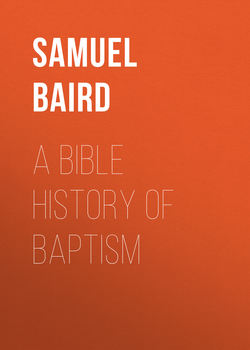Читать книгу A Bible History of Baptism - Baird Samuel John - Страница 4
Book I.
OLD TESTAMENT HISTORY
Part I.
BAPTISM AT SINAI
Section I. —Baptism Originated in the Old Testament
ОглавлениеAt the time of Christ’s coming, baptism was a rite already familiar to the Jews. The evangelists testify of them that, “when they come from the market, except they baptize (ean mē baptisōntai) they eat not. And many other things there be which they have received to hold, as the baptisms (baptismous) of cups and pots and brazen vessels and tables.” – Mark vii, 3, 4. On account of this rule of tradition, a Pharisee at whose table Jesus was a guest “marveled that he had not first baptized (ebaptisthē) before dinner.” – Luke xi, 38. Hence, when John came, a priest, baptizing, there was no question raised as to the origin, nature, form, or divine authority of the ordinance which he administered. The Pharisees, in their challenge of him, confine themselves to the single demand, by what authority he ventured to require Israel to come to his baptism, since he confessed that he was neither Christ nor Elias nor that prophet. (John i, 25.) Their familiarity with the rite forbade any question concerning it. Had we no further light on the subject, we might suppose that this ordinance had no better source than the unauthorized inventions of Jewish tradition. But the Apostle Paul,2 an Hebrew of the Hebrews, taught at the feet of Gamaliel, and versed in all questions of the law, excludes such an idea. He declares that in the first tabernacle “were offered both gifts and sacrifices that could not make him that did the service perfect as pertaining to the conscience; which stood only in meats and drinks and (diaphorois baptismois) divers baptisms– carnal ordinances imposed on them until the time of reformation.” – Heb. ix, 9, 10. The conjunction “and” (“divers baptisms and carnal ordinances”) is wanting in the best Greek manuscripts; is rejected by the critical editors, and is undoubtedly spurious. The phrase “carnal ordinances” is not an additional item in the enumeration, but a comprehensive description of “the meats and drinks and divers baptisms” of the law. Paul thus speaks of them by way of contrast with the spiritual grace and righteousness of the Lord Jesus. A critical examination of this passage will be made hereafter. For the present, we note two points as attested by the apostle:
1. Among the Levitical ordinances there were not one but divers baptisms.
2. These were not merely allowable rites, but were “imposed” on Israel as part of the institutions ordained of God at Sinai.
It may be proper to add that they were baptisms of persons, and not of things. They were rites which were designed to purify the flesh of the worshiper. (vs. 9, 13, 14.)
These baptisms were, therefore, well known to Israel, from the days of Moses. This explains the fact that, in the New Testament, we find no instruction as to the form of the ordinance. It was an ancient rite, described in the books of Moses and familiar to the Jews when Christ came. No description, therefore, was requisite. We are then to look to the Old Testament to ascertain the form and manner of baptism.
2
I assume what I believe to be demonstrable, that Paul was the author of the Epistle to the Hebrews.
